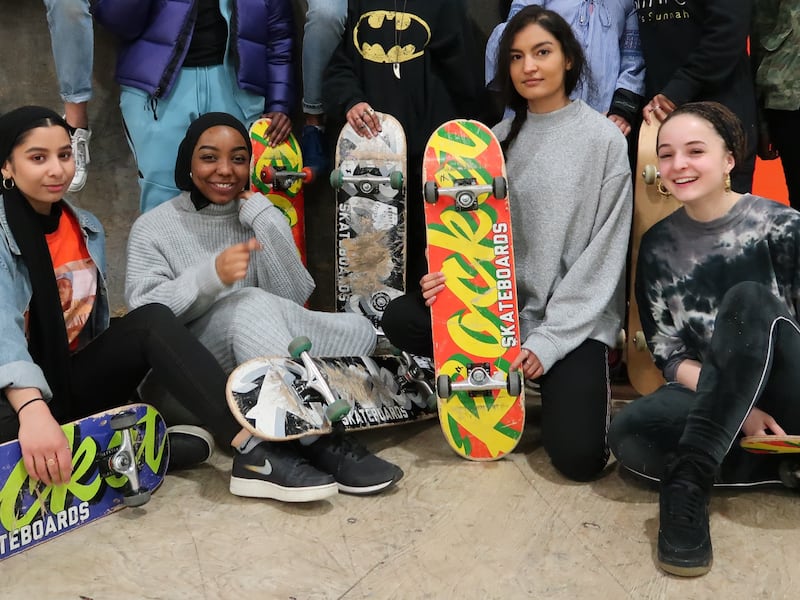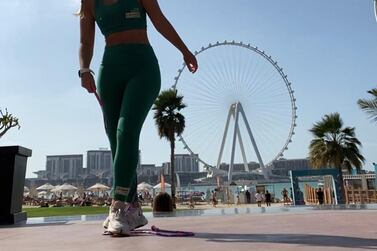When Hannah, 17, first went to her local skatepark in Georgia in the US, she didn’t feel entirely comfortable. “The skate scene is dominated by men and the environment seemed very intimidating,” she says.
Her father initiated a dialogue with a skater, who then taught Hannah (last name withheld upon request) feet placement and basic moves. While she wears the hijab – and has heard stories of racial profiling – Hannah says she hasn’t faced any negative experiences. “Most men are surprised and curious to see a girl skating. It’s nice to see that they don’t outwardly judge me [because of the hijab].”
In the two years she’s been skating, Hannah has only met three other black female skaters.
“Like me, they seemed pretty shy to try skateboarding or take up space.”
Although Hannah has received quiet nods and smiles of encouragement from fellow male skaters, she says she craves the company of other women with similar interests. “I most definitely wished there were more Muslim women on the skate scene,” she says.
As it turns out, there were many others like her who were looking for a safe and inclusive space to practise the sport. Obsessed with skater culture and its brands, Hannah stumbled upon Skater Uktis (uktis translating as sisters from the Arabic) on social media. The group started in 2020, and connects female Muslim skaters around the world; prior to the pandemic, it also hosted skating meet-ups.
From London to the rest of the world
Skater Uktis came together when a group of skaters noticed there were no women in the scene in London, let alone Muslim women. As a way to increase representation and inspire others to enter the arena, the group founded a community that has now grown to 21 representatives from 14 countries, including the UAE, Saudi Arabia and even as far away as Norway.
The global community believes that a Muslim female skate crew is also a subtle way of tackling Islamophobia in the West. People will have an opportunity to interact with Muslim women and see that nothing restricts them from prasticing an outdoor sport such as skateboarding. Skater Uktis members come from all spectrums of religiosity, and many choose to wear a hijab, niqab or abaya.
Sport and spirituality
The crew also encourage members to grow spiritually and contribute to society. They host online spiritual sessions, or halaqahs, on topics such as mindfulness, leadership, social justice and race in the context of Islam. The skating and spiritual meet-ups, or seshs, are open to women of all backgrounds and faiths.
“People often wonder, ‘What do these seemingly diverse things, skating and religion, have to do with each other?” says Hafsah (last name withheld upon request), the social media representative for Skater Uktis. “Both have an aspect of personal development to them. You are constantly tripping, falling, learning. You become aware of yourself, and your strengths and weaknesses.”
Skater Uktis also provides a platform for Muslim women to nurture their leadership qualities. “The idea is to reroute it back to Islam and the position of women in Islam,” says Hafsah.
Hafsah cites the example of how Aisha, the wife of the Prophet Mohammed, took an active role, by narrating more than 2,000 of the Prophet Mohammed's sayings and leading a battle, but also that she is said to have raced her husband for fun.
“Muslim women are in several domains, be it education or sports. We want to overcome the cultural idea that restricts women to one domain,” Hafsah says.
More than just child's play
Nadeen Alhamad, 23, is Skater Uktis' representative from Jenin, Palestine. She bought her first skateboard in 2019 and travelled to a skatepark in Ramallah. “I used to practise near my apartment, but then I went to Ramallah because it has a much bigger skating scene,” she says. “There were some really good skaters there.”
Although it is usual to see hijab-wearing woman in Palestine, it is unconventional to see older girls in the skatepark. “Some women are shy to participate in sports. The cultural expectation is that we have to be serious and responsible. If you spot a woman on a skateboard, it is seen as a toy.”
Alhamad met Skater Uktis members at the park, who in turn, introduced her to the community. She remembers the encouragement she received and, as a current Skater Uktis representative herself, she now extends the same support to other women and encourages them to try their hand at the sport.
“I want it to be a comfortable space for all of us. I tell them: ‘Skateboarding can be challenging, but if you want to, you can do it.’”
Hannah echoes the sentiment. “This space is open to change. I see so many people who don’t go to skateparks because they are afraid they will be made fun of. We need more girls in the skate space to create a familiar, friendly and inclusive environment.”







